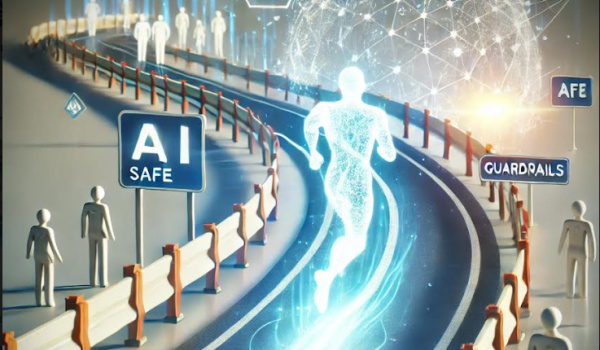By Greg Woolf, AI RegRisk Think Tank
In the AI gold rush, it’s hard to ignore the staggering numbers behind Safe Super Intelligence (SSI), a company launched by OpenAI co-founder Ilya Sutskever. SSI has raised $1 billion at a jaw-dropping $5 billion valuation, but here’s the kicker—they don’t even have a product yet! Investors like Andreessen Horowitz and Sequoia Capital appear to be throwing money at the team’s vision, trusting that Sutskever’s reputation alone can carry the project forward. But skeptics wonder if this signals the peak of an AI bubble, with trillions on the line but no clear roadmap for return on investment.
SSI’s mission to develop safe AGI (Artificial General Intelligence) appears to go beyond just a technical challenge—it represents a fundamental shift in how companies like this are funded. SSI’s $1 billion raise frees it from the burdens of traditional investor pressures like quarterly targets or immediate revenue generation, allowing the team to focus exclusively on their singular goal of building a safe superintelligence without commercial distractions. In a market where AI companies like NVidia, Microsoft, and Google are constantly juggling product launches with Wall Street’s relentless expectations, SSI has gained the advantage of concentrating purely on its mission.
Reading the Writing on the Wall: OpenAI and Anthropic Join the US AI Safety Institute
Earlier this year, the U.S. Department of Commerce launched the AI Safety Institute to ensure the safe development and deployment of artificial intelligence systems. Through this initiative, Commerce Secretary Gina Raimondo aims to “out-innovate the world” in AI while setting standards and best practices for safe implementation. Raimondo also oversees semiconductor funding and export restrictions to China, underscoring the importance of innovation and security in maintaining U.S. leadership in AI.
With the rise of safety-focused AI ventures like SSI, OpenAI appears to be responding to growing pressures in the industry. Despite a history marred by controversy over AI safety and the temporary ousting of CEO Sam Altman, OpenAI has joined forces with the U.S. Artificial Intelligence Safety Institute (AISI). Some see this move as a calculated effort to keep pace with the AI safety narrative that’s rapidly gaining traction amid fears of unregulated AI expansion.
And the US Follows Suit: Joining The First-Ever Binding Global AI Treaty
In a significant development for AI governance, the Council of Europe has secured the first legally binding AI treaty, with the U.S., EU, and other nations jumping on board. The Framework Convention on Artificial Intelligence and Human Rights, Democracy, and the Rule of Law establishes obligations for transparency, prohibits discrimination, and enforces privacy protections. With oversight mechanisms to ensure compliance, this treaty could reshape how AI systems are deployed. However, with major players like China, Russia, India, and Japan absent, questions remain about the treaty’s global influence and the competitive advantage for non-participating countries to innovate faster.
So, What Does Safe AI Really Look Like?
As SSI, Anthropic, and OpenAI rush to align themselves with the AI safety movement, and the U.S. aligns itself with Europe on AI regulation, the question on everyone’s mind is: What does real AI safety look like? With no consensus on how to properly govern superintelligence, we might be witnessing the early stages of an industry grappling with its own runaway success. Investors and developers are walking a tightrope between innovation and regulation, and the stakes couldn’t be higher.
The coming years will reveal whether these moves toward safety are genuine or just part of a mad scramble to get AI under control before we experience negative side effects. Not likely the dystopian destruction of humanity like Terminator; but the impact on consumer rights and the economy could be monumental. One thing is clear: the AI race is far from over, and safety may be the deciding factor.
 Greg Woolf is an accomplished innovator and AI strategist with over 20 years of experience in founding and leading AI and data analytics companies. Recognized for his visionary leadership, he has been honored as AI Global IT-CEO of the Year, received the FIMA FinTech Innovation Award, and was a winner of an FDIC Tech Sprint. Currently, he leads the AI Reg-Risk™ Think Tank, advising financial institutions, FinTech companies, and government regulators on leveraging AI within the financial services industry. https://airegrisk.com
Greg Woolf is an accomplished innovator and AI strategist with over 20 years of experience in founding and leading AI and data analytics companies. Recognized for his visionary leadership, he has been honored as AI Global IT-CEO of the Year, received the FIMA FinTech Innovation Award, and was a winner of an FDIC Tech Sprint. Currently, he leads the AI Reg-Risk™ Think Tank, advising financial institutions, FinTech companies, and government regulators on leveraging AI within the financial services industry. https://airegrisk.com








